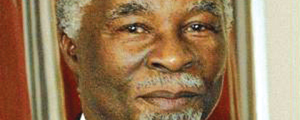
PRESIDENT Robert Mugabe’s government has toned down its indigenisation rhetoric after advice from former South African President Thabo Mbeki, who privately visited the country a fortnight ago, sources have said. PAIDAMOYO MUZULU
Since meeting Mbeki, Mugabe has made two public statements at the Independence Day celebrations in Harare and in Bulawayo at the Zimbabwe International Trade Fair last week where he called on investors to come to Zimbabwe, saying the indigenisation law was not rigid.
“Mbeki came to discuss with Mugabe the country’s investment perception especially by foreign players, who are sceptical on whether their investments will be secure especially with frequent indigenisation rhetoric from his ministers,” the source said.
It is not the first time, however, that Mbeki has spoken to Mugabe about foreign investors’ perception on doing business in Zimbabwe.
Two years ago, Mbeki told Mugabe at the Victoria Falls Diamond Conference that his ministers had demanded $10 million bribes from would-be investors.
But political analyst Ibbo Mandaza said while he was not privy to the purpose of Mbeki’s visit, it was placing too much in trusting him to have changed the country’s indigenisation policy.
“I doubt that Mbeki can influence the country’s policy, but it may be true that he was making representations about foreign investors who have interests in the country,” Mandaza said.
Political analyst Eldred Masunungure concurred with Mandaza saying Mbeki alone could not have changed the policy position, but a multitude of factors have conspired against Mugabe to change course.
- Chamisa under fire over US$120K donation
- Mavhunga puts DeMbare into Chibuku quarterfinals
- Pension funds bet on Cabora Bassa oilfields
- Councils defy govt fire tender directive
Keep Reading
“The law of the situation compels Mugabe to change course as the economy is sliding back to the pre-2008 era and it is a universally agreed fact that indigenisation as presently constituted was a major stumbling block to investment,” Masunungure said.
He added: “It’s possible, but improbable, it is rare for Mugabe to be moved by one person (Mbeki) using a wave of pressure unless given a mountain of evidence why he should change course.”
The analysts agree that the wave of economic challenges akin to the pre-2008 period of economic turbulence may be forcing Mugabe to tone down on the rhetoric as he tries to salvage the declining economy.
Nearly a year after the July general elections, Zimbabwe is facing bleak economic statistics. The World Bank this week revised downwards 2014 economic growth projections for Zimbabwe from 4,2% to 3%.
The revenue authority, Zimra, has also indicated that the authority is missing its revenue targets forcing the government twice this year to shift civil servants’ pay dates.
Zimbabwe’s economy after nearly a decade of decline started registering positive growth in 2008 after the signing of the Global Political Agreement (GPA) by Zanu PF and the two MDC formations.
The GPA was facilitated by Mbeki when he was South African President beginning in 2007 until the deal was signed among the erstwhile political enemies.
The coalition government (2008 – 2013) brought some political stability and nascent economic recovery.











